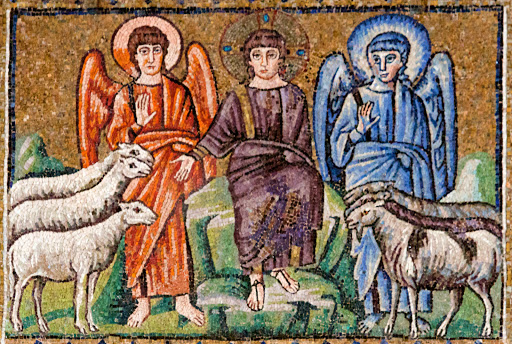Not long ago at Little Flowers Community, I taught (as many did) from John 9- namely, the story of the man who was blind from birth and whom Jesus healed. The text it full of important truths, but there was one aspect that emerged for me that I had not considered before, so I wanted to explore it here with you.
In the text, Jesus heals the man by mixing mud, putting it on the man’s eyes, then having him go wash it off. When the Pharisees hear of this, they are very upset that Jesus would dare to break Sabbath by making mud. As most of us know, Jesus didn’t need to make mud to heal the man, it seems as though breaking the rule was the whole point. He knew the response this would cause. So why did He do it?
Before we answer that, let’s unpack why it was a violation. Fittingly, we need to start in Genesis:
“By the seventh day God had finished the work he had been doing; so on the seventh day he rested from all his work. Then God blessed the seventh day and made it holy, because on it he rested from all the work of creating that he had done.” -Gen. 2:2-3
The word “work”, as we see it used above, is the Hebrew word melakha (מלאכה) which does not translate well into our understanding of the word in English. We can see from the context that there is something much more significant than just “activity done in order to achieve a purpose or result”. It is related to creating. Thus, when we read the word melakha again in Exodus 31:12-17, we see the challenge:
“Then the Lord said to Moses, “Say to the Israelites, ‘You must observe my Sabbaths. This will be a sign between me and you for the generations to come, so you may know that I am the Lord, who makes you holy. “‘Observe the Sabbath, because it is holy to you. Anyone who desecrates it is to be put to death; those who do any work on that day must be cut off from their people. For six days work is to be done, but the seventh day is a day of sabbath rest, holy to the Lord. Whoever does any work on the Sabbath day is to be put to death. The Israelites are to observe the Sabbath, celebrating it for the generations to come as a lasting covenant. It will be a sign between me and the Israelites forever, for in six days the Lord made the heavens and the earth, and on the seventh day he rested and was refreshed.’”
As a result, much debate has been had (and continues to happen) around what constitutes the work that is prohibited during Sabbath, as it is not explicitly laid out in Scripture. Rather, based on the Mishna Shabbat Shabbat 7:2, thirty-nine activities were identified as prohibited. They are:
- Sowing
- Plowing
- Reaping
- Binding Sheaves
- Threshing
- Winnowing
- Selecting
- Grinding
- Sifting
- Kneading
- Baking
- Shearing Wool
- Cleaning
- Combing
- Dyeing
- Spinning
- Stretching the Threads
- Making Loops
- Weaving Threads
- Separating the Threads
- Tying a Knot
- Untying a Knot
- Sewing
- Tearing
- Trapping
- Slaughtering
- Skinning
- Salting
- Tanning
- Scraping
- Cutting
- Writing
- Erasing
- Building
- Breaking Down
- Extinguishing a Fire
- Kindling a Fire
- Striking the Final Hammer Blow
- Carrying
Jesus, then, would have been in violation of the rule against kneading, which included creating something new by combining two things, such as water and earth to make mud (which is called Blilah Aveh). Violating these rules was not acceptable, except in the case of Pikuach Nefesh (פיקוח נפש). This is the principle in Jewish law that allows (even requires) the breaking of laws in the case of saving someone’s life.
It is very likely that Jesus’ violation of these rules was, at least in part, a commentary on His interpretation of what was acceptable. It would be a mistake for us to use this as an example of Jesus showing no respect for (or even throwing out) His Jewish faith, traditions and laws.
Further, we might also argue that Jesus sees the man’s blindness as separating Him from God and neighbour (given his social and religious standing as a beggar and “unclean”), thus a threat to the quality of His life that qualified as a reason to violate the rules. Even here, though, the use of mud was unnecessary, so we are left wondering.
As I considered all this, something occurred to me: Jesus didn’t perform miracles to show off how powerful He was. He was moved by compassion, by love. Therefore, what if violating the rule was an act of love? And if so, how was it an act of love? That’s when it struck me:
By breaking the rule, Jesus placed Himself outside the religious and social boundaries of acceptability, moving into the same margin in which the blind man found himself.
In other words, Jesus did the very thing the incarnation was all about- God dwelling among us as one of us, even when such presence would be seen as a condescension for the divine. Rather than a God that demands moral purity before He will allow us to encounter Him, Jesus is God-made-flesh, pursuing us in the midst of our sin and brokenness, even to point of ultimate exclusion- death on the cross.
The implications of this for us are overwhelming. Even when doing so violates long-held religious and/or social norms, we are called to relocate our lives alongside those who have been pushed to the margins. It’s not about thumbing our nose at the institutions or powers that be, but rather we are motivated by the same love the pursued us in spite of our failings. This distinction is important because, while prophetic rebuke of injustice is critical, it is not our primary vocation. Our vocation, as followers of Christ, is to love God and love others as ourselves.
May God open the eye of my heart to see those on the outside as He sees them, following Jesus to stand among them in love. Amen.





 “A powerful exploration, forcing the reader to ponder some key questions in the death penalty debate: family, guilt, revenge, mercy, justice. ‘The Last Verdict’ will stimulate passionate discussion.” –Julian McMahon, Barrister for Van Tuong Nguyen and members of the Bali Nine.
“A powerful exploration, forcing the reader to ponder some key questions in the death penalty debate: family, guilt, revenge, mercy, justice. ‘The Last Verdict’ will stimulate passionate discussion.” –Julian McMahon, Barrister for Van Tuong Nguyen and members of the Bali Nine.


